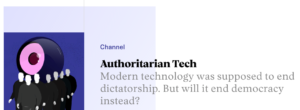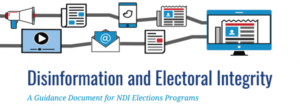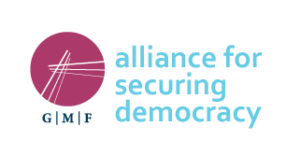“They took your data. Then they took control.” The Great Hack, a new Netflix documentary exposes the dark underside of data exploitation through the personal odysseys of protagonists in the explosive Cambridge Analytica/Facebook data scandal.
Cambridge Analytica offered clients no less than a “full service propaganda machine,” according to what a NY Times critic calls “an eye-opening new documentary from Jehane Noujaim (“Control Room”) and Karim Amer that explores how our personal data has become a commodity that is collected, analyzed and then spit back at us in the form of targeted messaging, with the hope of changing our behavior.”
Foreign interference is increasingly being exposed across the span of open democracies, able to piggy-back on much of the technological architecture that was allowed to be built around us, the Lowy Institute notes. Understanding the social consequences of cybersecurity now needs to sit alongside cybersecurity in analysis, education, policy and lines of effort. In this, future research is essential to securing a truly democratic future.
Talking of which…..

Coda Story
A nonprofit with deep ties to the newspaper industry is investing $50 million into research on technology’s impact on democracy — from countering online disinformation to how companies such as Facebook and YouTube impact public opinion, The Washington Post reports:
The John S. and James L. Knight Foundation announced this morning that it would fund new research at 11 universities in the hopes of ushering in a new academic field of study. The organization, which was founded by the owners of newspapers such as the Miami Herald, has been trying to stay on top of trends that are changing journalism — and one of the most pressing issues right now is how fake news and information is undermining what people can trust online.
“It’s our modern-day Gutenberg moment. Even as we embrace the benefits of the Internet, we need to grapple with its effect on our democracy,” said Alberto Ibargüen, the president and chief executive of the Knight Foundation. “We need more research, data and insights to do it effectively and avoid unintended consequences. These investments make that possible.”
 Tech giants haven’t just inadvertently created a new path for information warfare. Rather they have created the architecture for the persistent manipulation of whole societies – an architecture freely used by both adversaries and the tech corporations themselves, the Lowy Institute adds. As trust has eroded in democratic societies, state and non-state entities alike have exploited the masses of surplus data to engineer people’s behaviour for strategic and financial gain.
Tech giants haven’t just inadvertently created a new path for information warfare. Rather they have created the architecture for the persistent manipulation of whole societies – an architecture freely used by both adversaries and the tech corporations themselves, the Lowy Institute adds. As trust has eroded in democratic societies, state and non-state entities alike have exploited the masses of surplus data to engineer people’s behaviour for strategic and financial gain.
There is a real danger that fraudulent news―demonstrably false information presented as fact with the intent to deceive―may become a new normal in political campaigns, says PEN America. It’s Democracy Against Disinformation campaign is calling for party-wide frameworks to discourage and prevent disinformation tactics, that parties’ candidates make similar commitments, and denounce fraudulent news―including when it is directed at a political opponent or promoting a political cause that they or their candidates support.
 Director of National Intelligence Dan Coats announced the creation of a new position, the Election Threats Executive, to coordinate and integrate election security efforts across the intelligence community in responding to the “enduring challenge” of foreign electoral interference, the Alliance for Securing Democracy reports. In testimony before Congress in May, ASD Director Laura Rosenberger advocated creating a senior coordinator on the National Security Council to counter foreign interference across the entire government.
Director of National Intelligence Dan Coats announced the creation of a new position, the Election Threats Executive, to coordinate and integrate election security efforts across the intelligence community in responding to the “enduring challenge” of foreign electoral interference, the Alliance for Securing Democracy reports. In testimony before Congress in May, ASD Director Laura Rosenberger advocated creating a senior coordinator on the National Security Council to counter foreign interference across the entire government.
Data-Driven Foreign Aid with Internews VP Kat Duffy
 Join Tech4Dem for a a conversation with Kat Duffy, Vice President for Global Technology Programs at Internews, to discuss the role of data in shaping development programming. Specifically:
Join Tech4Dem for a a conversation with Kat Duffy, Vice President for Global Technology Programs at Internews, to discuss the role of data in shaping development programming. Specifically:
- where are the voices of the “beneficiaries” of foreign assistance in digital development strategies?
- how are their perspectives and rights informing the decisions donors and INGOs make with regard to data collection, aggregation and use within foreign aid?
Come join IREX, NDI, and IRI [partners of the National Endowment for Democracy] for a lively discussion and drinks—appetizers on us!—on Thursday July 25th from 5:30 to 7:30 at Mad Hatter bar in Dupont Circle.
Thursday, July 25 2019
5:30 to 7:30 PM
Madhatter DC
1319 Connecticut Ave NW, Washington DC
RSVP







